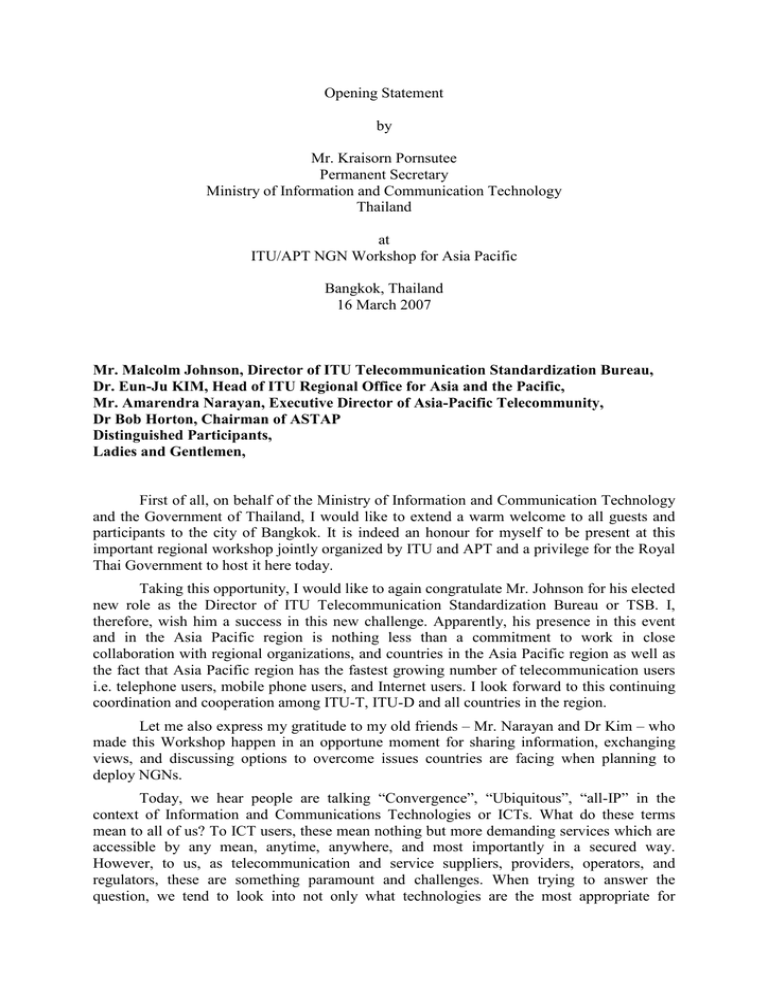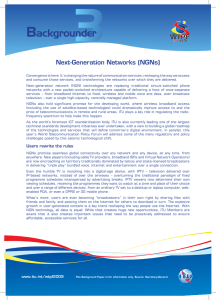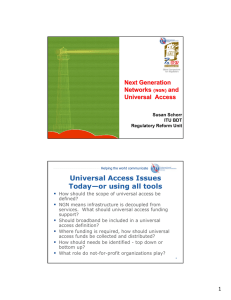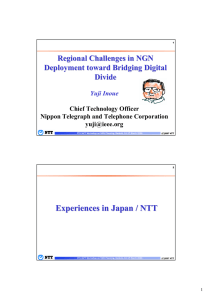Opening Statement by Mr. Kraisorn Pornsutee
advertisement

Opening Statement by Mr. Kraisorn Pornsutee Permanent Secretary Ministry of Information and Communication Technology Thailand at ITU/APT NGN Workshop for Asia Pacific Bangkok, Thailand 16 March 2007 Mr. Malcolm Johnson, Director of ITU Telecommunication Standardization Bureau, Dr. Eun-Ju KIM, Head of ITU Regional Office for Asia and the Pacific, Mr. Amarendra Narayan, Executive Director of Asia-Pacific Telecommunity, Dr Bob Horton, Chairman of ASTAP Distinguished Participants, Ladies and Gentlemen, First of all, on behalf of the Ministry of Information and Communication Technology and the Government of Thailand, I would like to extend a warm welcome to all guests and participants to the city of Bangkok. It is indeed an honour for myself to be present at this important regional workshop jointly organized by ITU and APT and a privilege for the Royal Thai Government to host it here today. Taking this opportunity, I would like to again congratulate Mr. Johnson for his elected new role as the Director of ITU Telecommunication Standardization Bureau or TSB. I, therefore, wish him a success in this new challenge. Apparently, his presence in this event and in the Asia Pacific region is nothing less than a commitment to work in close collaboration with regional organizations, and countries in the Asia Pacific region as well as the fact that Asia Pacific region has the fastest growing number of telecommunication users i.e. telephone users, mobile phone users, and Internet users. I look forward to this continuing coordination and cooperation among ITU-T, ITU-D and all countries in the region. Let me also express my gratitude to my old friends – Mr. Narayan and Dr Kim – who made this Workshop happen in an opportune moment for sharing information, exchanging views, and discussing options to overcome issues countries are facing when planning to deploy NGNs. Today, we hear people are talking “Convergence”, “Ubiquitous”, “all-IP” in the context of Information and Communications Technologies or ICTs. What do these terms mean to all of us? To ICT users, these mean nothing but more demanding services which are accessible by any mean, anytime, anywhere, and most importantly in a secured way. However, to us, as telecommunication and service suppliers, providers, operators, and regulators, these are something paramount and challenges. When trying to answer the question, we tend to look into not only what technologies are the most appropriate for converged networks and services, but also what kind of skills people need to have, and how we migrate from legacy networks to new generation networks in a cost-justified manner. In the past several years, NGN has been overwhelmingly said as something to answer the aforementioned question, although it is a broad term to describe a general idea that one network transports all information and services including voice, data and all sorts of media such as video, over the Internet Protocol or IP. In the mean time, we have witnessed several countries – most of them developed countries – deploying new generation networks which are meant to be NGNs and to offer users a service convergence over a converged network. Nevertheless, many developing countries in the Asia Pacific in particular are struggling with deploying and migrating to an NGN, even when in a planning stage due to several issues ranging from technological and regulatory issues, to human resource and strategic issues, as well as the fact that different countries have different circumstances, for example, when taking over NGN for remote areas including mountainous terrain and dispersed islands. These make it difficult for one to benchmark and move on its own and without proper guidance towards the same fashion as one has done successfully. Distinguished Participants, Ladies and Gentlemen, When I learned that ITU and APT were going to organize this Workshop and saw the agenda, I was delighted because many issues which are priority and are keys to the success of NGN deployment were going to be tackled. These include topics on, inter alia, Strategic planning, Short and long term planning for NGN deployment, NGN planning tools, and NGN for rural communications. Also it is very exciting that we have a number of experts not only those who are speakers, but also those who represent countries and organizations, gathering in this Workshop which I believe they would substantially contribute to this event and together make a concrete outcome. Furthermore, I am very grateful to ITU which took on “NGN Planning” as one of the five Regional Initiatives to be implemented in the coming four years. This Workshop is considered, though not the first event, one step forwarded which will be followed by several activities and events in the near future. In closing, on behalf of the Ministry of Information and Communication Technology, I would like to once again extend my gratitude to ITU and APT for jointly organizing this crucial Workshop and I wish to see continuing cooperation among the two and all countries in the region. My thanks also go to all experts and delegates who many of them have come long way to participate in this Workshop. Thailand is looking forward to continuing close collaboration with all of you to bring about success in this particular area of NGN deployment hence connecting people and making ICTs accessible no matter where they are. I wish you a great success on your deliberation and all of you a pleasant time in Bangkok. Thank you. -----------------------------------


